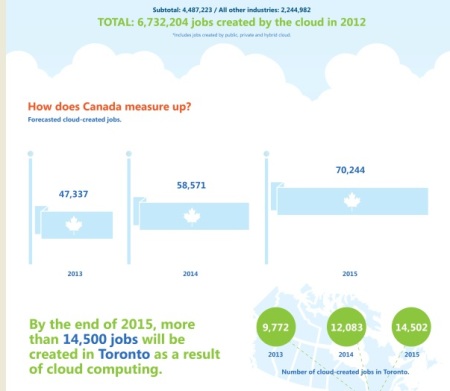by Nestor E. Arellano
Forget about silver linings. If predictions of a recent IDC survey pan out, the cloud is one giant goldmine .

The analyst firm forecasts that cloud computing will create no less than 14 million new jobs worldwide by 2015. Microsoft Corp., which commissioned the survey, also says that IT innovations created by cloud computing could produce no less than $1.1 trillion a year in new business revenues.
Just over 70,000 of these jobs will be located in Canada. InToronto, new jobs associated with the cloud will increase by an average of 20 per cent annually, resulting in more than 14,500 jobs by 2015.
Tech jobs that cloud computing will create
Microsoft Office 365 selling like hot cakes to SMBs
Last year, according to IDC, cloud computing helped businesses around the globe create in excess of 1.5 million jobs. More than half of those jobs were in the small and medium sized business sector. InToronto, businesses with less than 500 employees will see an increase of more than 6,300 new jobs by 2015 while larger companies will see an increase of more than 8,100 jobs.
But the main message of the survey findings is not job creation alone. Of course if cloud computing delivers on those numbers, it would certainly be great for the economy. But let’s not be dazzled by the mega job projections.
The bigger message behind the survey, I believe, is how cloud computing has grown to encompass every industry and why businesses should determine whether they should be using cloud technology or not.
The same survey said that in 2011, businesses worldwide spent more than $28 billion in cloud services. That same year, cloud services helped businesses around the world generate more than $400 billion in revenue.
“These are not just technology companies we’re talking about, and they are not just large enterprises. Cloud computing has the potential to create an impact on almost any business in any industry,” according to John Weigelt, national technology officer for Microsoft Canada.
He further explains that not all the projected jobs will be in technology. “When companies are able to cut costs on technology through cloud computing, their resources are freed up to explore other projects, develop other products or services. New jobs come up in administration, sales, marketing or other departments.”
Weigelt sees the cloud as a “revolutionary technology”. He compares it to electricity which radically changed people’s day-to-day lives, how we conducted business and created goods. “The cloud today is transforming how we see business happening, how we manage computer resources and how we manage the market place.”
I do see how it has been able to aid a lot of organizations to maximize resources, improve processes and even discover new opportunities. However, for all the success stories around how companies have managed to use cloud computing, the technology is far from mature and certainly not for every business. The recurring reports of outages and crashes, massive data breaches, and even the all too many examples of cloud providers’ failure to address critical factors such as privacy, lead me to believe that attaining a universal confidence and faith in the technology is still – up in the clouds.
Weigelt admits “cloud computing may not be for every business.” He is also right when he says that companies should investigate if any cloud service might help out their business.
Canadian SMBs still not sold on cloud computing: survey
Cloud spotting: which type is right for your business?
Companies need not turn their businesses upside down just to shoehorn cloud technology into their process or network. But if such a large amount of money is being spent today by other businesses in cloud computing and if other businesses (including the competition) are reaping rewards and revenue from it, a sensible entrepreneur would probably find it worthwhile to investigate.
Rather than taking a dive, businesses I believe should move cautiously, taking care to keep their focus on their business needs and goals rather than on the technology.







